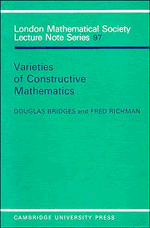2 - CONSTRUCTIVE ANALYSIS
Published online by Cambridge University Press: 04 April 2011
Summary
In which various examples are given to illustrate techniques and results in constructive analysis. Particular attention is paid to results which are classically trivial, or have little or no classical content, but whose constructive proof requires considerable ingenuity. The final section draws together various ideas from earlier parts of the chapter, and deals with a result which is interesting both in itself and for the questions raised by its proof.
Complete metric spaces
The appropriate setting for constructive analysis is in the context of a metric space: there is, as yet, no useful constructive notion corresponding to a general topological space in the classical sense.
We assume that the reader is familiar with the elementary classical theory of metric spaces and normed linear spaces. Most definitions carry over to the constructive setting, although we may have to be careful which of several classically equivalent definitions we use. For example, some classical authors define a closed set to be one whose complement is open, whereas others define a closed set S to be one containing all limits of sequences in S; it turns out that the latter is the more useful notion, and hence the one adopted as definitive, in the constructive setting.
- Type
- Chapter
- Information
- Varieties of Constructive Mathematics , pp. 18 - 48Publisher: Cambridge University PressPrint publication year: 1987



